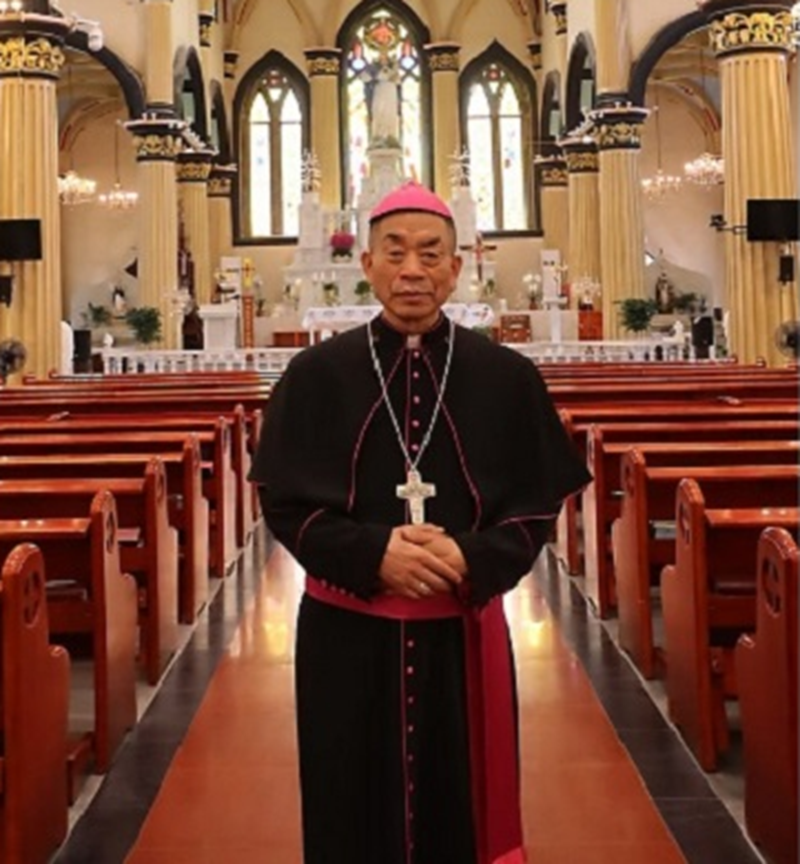Fuzhou: Chinese authorities recognise 'underground' auxiliary bishop
The ceremony took place today in Fujian province. Leo XIV, in his first choice regarding the Church in China, formally appointed Lin Yuntuan alongside Ordinary Bishop Cai Bingrui (the last Chinese bishop appointed by Francis in January). The Holy See is satisfied with this “important step" that confirms the “journey of communion" at the basis of the agreement with Beijing. There is hope that things will turn out better than in Mindong.
Vatican City (AsiaNews) – Chinese authorities have officially recognised an underground bishop in China’s Fujan province. Pope Leo XIV appointed him today as auxiliary bishop of Fuzhou, in his first episcopal appointment regarding China.
In a press release, the Holy See Press Office announced that Joseph Lin Yuntuan, 73, was officially installed as Bishop Cai Bingrui’s auxiliary this morning, but he was first ordained to this post in late 2017.
Pope Francis appointed Bishop Cai Bingrui last January to head the Diocese of Fuzhou in what was his last episcopal appointment for the Church in China. It is therefore easy to read continuity in what happened today.
This is a major development with respect to the agreement between Rome and Beijing on episcopal appointments in force since 2018 and renewed for another four years last October.
The decision by Chinese authorities to recognise Bishop Lin Yuntuan favours the unity of one of China’s most important but also most divided Catholic communities, as AsiaNews had reported back in January.
Remarks by Lin Yuantuan regarding the appointment of a young man like 57-year-old Cai Bingrui, previously bishop of Xiamen, already hinted at things to come.
The “underground” prelate wrote five months ago that the Holy See hoped for his “active collaboration in guiding the clergy, nuns and faithful of Fuzhou so that they are obedient and support Bishop Cai Bingrui”.
Today’s act formally confirms these words, entrusting him with a role now recognised by the official, party-controlled bodies of the Church in China.
China Catholic, the website of the Chinese Catholic Patriotic Association, reported the installation ceremony that took place this morning in Fuzhou cathedral in the presence of about 300 people.
Bishop Vincent Zhan Silu of Mindong, one of two Chinese bishops who participated in the Synod last October in the Vatican, led the service together with the Ordinary Bishop of Fuzhou, Cai Bingrui, and Bishop Peter Wu Yishun of Shaowu (Minbei) Prefecture in northern Fujian (who is another of the last bishops appointed under the agreement last year). Together with Bishop Lin Yuantuan, they concelebrated a thanksgiving Mass.
China Catholic was quick to say that the new auxiliary bishop has sworn to respect "the Constitution and the laws of the country, safeguard the unity of the motherland and social harmony, love the country and religion, adhere to the principle of independence and self-management of the Church, follow with the sinicisation of Catholicism in our country and contribute to the overall construction of a modern socialist country and the all-round promotion of the great rebirth of the Chinese nation.”
However, the statement reads more like a formal declaration than a substantive statement to hide an obvious fact, namely the recognition that "underground" communities are important in the history and present of the Church in Fujian.
It is no coincidence that Bishop Cai Bingrui’s predecessor, Bishop Peter Lin Jiashian, who passed away in 2023at the age of 88, was also a former underground bishop, who also spent time in forced labour camps and was then recognised by the authorities in 2020, again pursuant to the Sino-Holy See agreement.
It is understandable that the Holy See is satisfied with today’s development, which objectively marks a step forward in the direction set by Pope Francis for the Church in China.
“We are pleased to learn that today, on the occasion of the taking possession of the Office of Auxiliary Bishop of Fuzhou by His Excellency Monsignor Joseph Lin Yuntuan, his Episcopal Ministry is also recognized for the purposes of civil law. This event constitutes a further fruit of the dialogue between the Holy See and the Chinese Authorities and is an important step in the journey of communion of the Diocese,” reads a statement by the Holy See Press Office Director Matteo Bruni.
The challenge now will be to see what actual role will be assigned to Auxiliary Bishop Lin Yuantuan in the management of the diocese and how much his presence will really help overcome the rift between “official” Catholics and “underground” communities.
It is hoped that things will go better than what happened in the neighbouring Diocese of Mindong, where the Vatican adopted the same solution in 2018 by appointing the “official” bishop, Zhan Silu, as ordinary, along with the “underground” bishop, Mgr Vincent Guo Xijin as auxiliary.
The “cohabitation” did not last long with Bishop Guo. Relegated to the margins, he resigned from the post after just two years. More recently he was subjected to serious restrictions because party-controlled Church bodies do not tolerate that many local Catholics still refer to him at least for their spiritual life.
With the choice announced today and the remarks released by the Holy See, Pope Leo XIV clearly shows that he wants to continue implementing the agreement signed by the Vatican with Beijing in 2018.
However, it remains to be seen what choices he will make with respect to the two elections for bishops that took place during the vacancy in Shanghai (for a new auxiliary bishop) and in Xinxiang (for a new ordinary), Henan province.
In fact, due to local concerns in the two dioceses, these two appointments raise more questions than the one in Fuzhou.
23/01/2025 19:25
12/09/2025 19:39
18/10/2024 17:53







.png)










